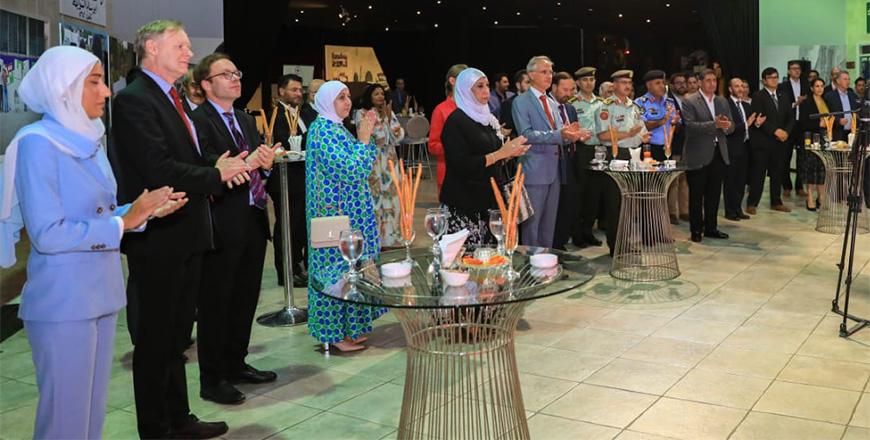You are here
ICRC brings plight of missing persons, families to fore
By Bahaa Al Deen Al Nawas - Aug 29,2019 - Last updated at Sep 02,2019

Syrian refugees make phone calls to maintain links with their families from the ICRC office in Azraq camp (Photo courtesy of ICRC)
AMMAN — Commemorating the International Day of the Disappeared, celebrated annually on August 30, the International Committee of the Red Cross (ICRC) shed light on the situation of missing people and the suffering of their families as well as the search process.
In an interview with The Jordan Times, Protection Coordinator Laurent Saugy, Delegate Responsible of the Missing File Martina Fava and Media Relations Officer Hala Shamlawi highlighted that the fate of missing persons is one of the ICRC’s operational priorities in the Middle East.
“In Jordan, we are very regularly approached by families of missing persons. Families of people who went missing in Syria for example,” Saugy said, adding that these families report that their loved ones were either arrested or disappeared in relation to the conflict in Syria.
As part of ICRC Jordan’s efforts to shed light on the issue of the missing, there will be an international experts’ meeting at the beginning of September at the Dead Sea, organised by the ICRC.
The meeting will be part of a global project for which experts meet around the world.
Saugy explained that the UN Security Council Resolution 2474 on Missing Persons in Armed Conflict, adopted on June 11 this year, sets out a number of critical principles related to the search for persons missing in armed conflicts.
Missing people have been part of the Geneva conventions since the end of the 19th century, he said, noting that this year commemorates the 70th anniversary of the 1949 Geneva Conventions, in which missing people are very prominently highlighted and the ICRC is mentioned as well.
The ICRC considers as missing all individuals whose whereabouts are unknown to their families.
For a family with a missing member the primary concern from day one is to get information on their missing beloved, Saugy said.
For anyone who has not been through the experience, it might be difficult to see the suffering that often includes psychological, psychosocial and financial struggles, especially for refugees, Saugy said.
There are also legal and administrative burdens on the family, especially if the disappeared is a father and husband, according to Saugy.
“These people are convinced that the relative is alive, they do not want to give up, and this is great,” the project manager said, adding that “the sad part is that if they seek the services of a bank or social services for example, they will say that ‘we can help you but we need a certificate of death’, but the families do not want to issue this certificate because it would be as if they were losing hope.”
The ICRC is working towards changing procedures so that families can issue a certificate that proves that a person is missing, but doesn’t say the person is dead.
“We try... to accompany them, be by their side, but at the same time the centre of what we commit to them, to help them to find information,” the project coordinator said, noting that this needs a lot of patience, because it can take years.
Fava said that for ICRC the families are at the centre of the work, “because based on what they share with us, we try to help them in response”, highlighting how the disappearance not only affects the family but also the community and entire society.
The ICRC is mandated to carry on communication with all warring parties, regardless of their political views, for the benefit of civilians and to obtain information on the missing people, Saugy said, noting that international laws compel conflicting factions to cooperate in the matter.
Therefore, even in conflict, the ICRC stays focused on the humanitarian side, using the legal obligation imposed by the international laws, mainly the Geneva Conventions, to help protect civilians and avoid unnecessary suffering through communication with authorities and armed groups to protect civilians and prevent disappearances.
According to Saugy and Fava, thousands of families from various nationalities have approached ICRC Jordan to report one or more missing members in their family, however the ICRC suspects that there are many others who do not know that the ICRC can help or did not yet have the chance to approach the Red Cross.
“Last year we facilitated 13,000 phone calls only between Syrian refugees in Jordan and their families in Syria. In 2018, the ICRC facilitated 1,200,000 messages and phone calls between separated families, globally,” Saugy said, emphasising the need to stay in touch with one’s family.
The ICRC stressed their primary focus on helping families first and foremost as well as letting others know about the suffering they go through in order to raise awareness and provide support.
Related Articles
AMMAN — To express solidarity with the families of missing persons and to mark the International Day of the Victims of Enforced Disappearanc
BEIRUT — The International Committee of the Red Cross has started collecting (ICRC) DNA samples to help identify thousands of people who dis
GENEVA — The Red Cross said on Wednesday it had visited 1,500 prisoners of war on both sides of the conflict in Ukraine, often sharing despe















